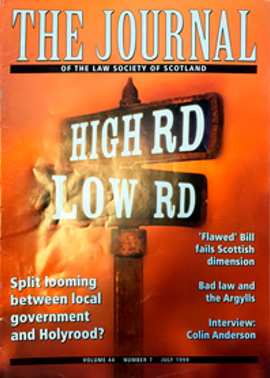More power to trustees
Trustees will have much greater investment powers if the joint report of the Scottish Law Commission and the Law Commission on Trustees’ Powers and Duties (Scot Law Com No 172, Law Com No 260) published on 21 July 1999 is implemented. The full text of the report is available at http://www.open.gov.uk/lawcomm. They will also be able to acquire land. This report is joint only so far as its recommendations on investment powers and land acquisition are concerned. In the rest of the report the Law Commission recommends many changes to trust law for England and Wales (such as allowing trust investments to be held by nominees).
Part of the impetus for change came from a proposal by HM Treasury to allow a 25:75 split between narrow-range investments and wider-range investments instead of the 50:50 split required by section 2 of the Trustee Investments Act 1961. The response was favourable but many preferred to see the restrictions removed altogether. Subsequently in 1996 the Treasury implemented the 25:75 split and published a consultation document, Investment Powers of Trustees, on the possible repeal of the 1961 Act. There was an overwhelmingly positive response from consultees throughout Great Britain (Northern Ireland has its own legislation on which a separate consultation was carried out).
The division of the trust fund between wider-range and narrower-range investments required by the 1961 Act has in practice proved to be cumbersome and unduly restrictive. It increases the cost of administering trusts to which the 1961 Act regime applies and deters smaller trusts from investing in wider-range investments, although safe, narrower-range investments are liable over the long term to have their value eroded by inflation. Moreover, even the wider range is nowadays regarded as too restrictive. As the law presently stands, trustees cannot invest in land or non-European companies unless authorised by the trust deed or the court. Most modern professionally-drawn trust deeds avoid these problems by giving the trustees very wide investment powers. Trusts which have had to invest in accordance with the 1961 Act have, over the past 30 years or so years, generally performed less well than comparable trusts which could invest freely.
The report’s main joint recommendation is that trustees should be able to invest as if they were the beneficial owners of the trust fund. There would be no restrictions; trustees could invest in fixed interest securities, shares of companies anywhere, land, pictures or even wine. The brake on rash and speculative investment will continue to be the trustees’ common law duty of care. Trustees may be held personally liable to the beneficiaries for losses caused by imprudent investment or by failure to review investments at appropriate intervals. The requirement in section 6 of the 1961 Act to obtain advice has been retained with amendments. Advice need not be in writing and need not be sought if the trustees reasonably conclude it is unnecessary or inappropriate. Small or obviously secure investments would therefore not need advice.
At present, trustees have no power to invest in or acquire land, with the minor exception of acquiring a residence for a beneficiary (section 4(1)(ee) of the Trusts (Scotland) Act 1921), unless this is authorised by the trust deed or the court. The report recommends that Scottish trustees should be able to acquire land for investment or for any other reason. Scots have often sought investment opportunities abroad, so land is not confined to land in Scotland, the United Kingdom or even the world. If there are profitable concessions on the Moon or Mars in the future, Scottish trustees could be there too.
The unrestricted powers recommended would apply to trustees of all post-commencement trusts unless the trust deed contained express restrictions. Most but not all trustees of pre-commencement trusts would also acquire these powers. The first category who would not are the trustees of pension schemes, authorised unit trusts and other statutory trusts. Their investment powers would remain as set out in the relevant primary or subordinate legislation (unless or until it is amended). Secondly, post-1961 Act trust deeds may restrict investment powers. For example, an “ethical” investment trust may prohibit trustees from investing in tobacco or armaments companies. Such restrictions will continue to be effective. However, if the trust deed simply restricts investments to those in the 1961 Act or those authorised by law, then the trustees are to have the unrestricted powers under the new legislation. Restrictions in pre-1961 deeds are to be treated differently. They were overridden by the 1961 Act with the result that the trustees had the powers conferred by that legislation. The Commissions’ report continues that policy by conferring on such trustees the recommended unrestricted powers.
It will be for the Scottish Executive and the United Kingdom Government to decide whether to implement the report and if so how. The Scottish recommendations could be implemented separately by the Scottish Parliament because trust law is not a reserved matter. Alternatively, the whole package could be enacted at Westminster with separate parts for Scotland and for England and Wales. The present report is the first step (albeit an important one) on the road to a modern law of trusts. The Scottish Law Commission intends to look at other aspects of Scottish trust law once it has completed its current law reform projects.






